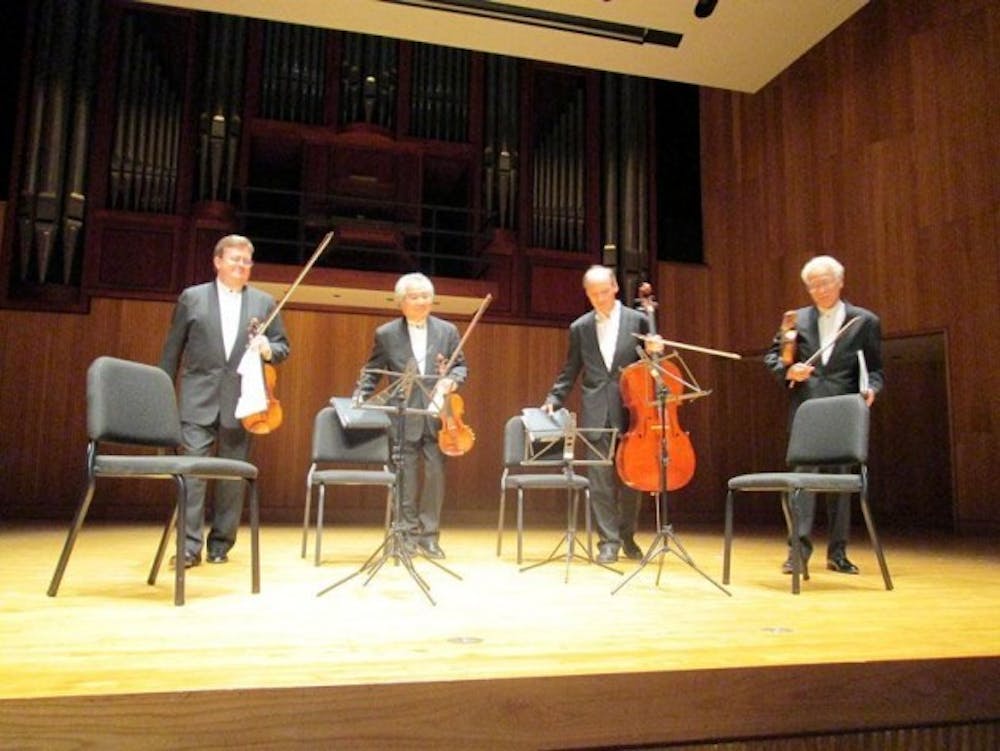The stage was bare except for four suited men, seated in an arc facing the audience. The only other item permitted with them on stage was a tall microphone placed before their arc. Fingers in position, poised elbows and trunk muscles free to move - the musicians were ready.
Last Friday evening, the Tokyo String Quartet performed at UB's Slee Hall as part of their farewell tour concert. The quartet - consisting of Martin Beaver and Kikuei Ikeda on the violins, Kazuhide Isomura on the viola and Clive Greensmith on the cello - is known worldwide as a supreme chamber ensemble.
They honored the audience with three pieces - Franz Joseph Haydn's "Rider," the String Quartet No. 59 in G minor; String Quartet No. 6 by B?(c)la Bart??k; and String Quartet No. 4 in E minor by Felix Mendelssohn - all which brought three very different experiences.
Albeit brilliant, the exhilarating Bart??k piece is where their talents peaked, both as musicians and as performers.Halfway through Bart??k's third movement, one of Beaver's bowstrings snapped but the quartet played on, unfazed by the mishap. Meanwhile, Beaver multi-tasked to deal with the snapped string flying all over the place with every sweep of his bow.
"He pulled the string, just 'schwoop,'" said Linda Freedman, a Buffalo native who works at the Kaleida Hospital. "It's amazing how they just work with it ... At first I thought ... what was he going to do? Stop playing?"
The Tokyo String Quartet's sound was clean and sharp, with every staccato and crescendo audibly distinct. Their attacks were memorable and their unity undisputed. This was evident during the Haydn piece, when after a lengthened pause they came in together at the precise time and note.
Haydn is a particular favorite of 70-year-old Robert Giannetti, a creative writing adjunct professor at Niagara University and an established American poet.
"You can hear in that [piece] a lot of the things that were picked up throughout the history of string quartet music," Giannetti said. "The tricks of the trade of the string quartet are right in there."
The musicians' eyes were wholly trained on the sheets in front of them, only occasionally peeling away to meet the eyes of each other, as though to share an intimate secret. The sense of interplay and musical conversation between them could make anyone in the hall envious.
"It is truly an honor and a privilege to host one of the world's most esteemed string quartets during their final season together," said Phil Rehard, concert manager at Slee Hall.
The Tokyo String Quartet performed an encore after a standing ovation from the audience. They played the last movement from Op. 20 No. 4, by Haydn, father of the string quartet.
"It's sad that this is their farewell concert. So I also wonder what is going through their minds and what would playing the pieces they have now leave to them," said Xi Yang Lee, a sophomore speech and hearing science major.
Last Friday's performance was the Tokyo String Quartet's final performance at Slee Hall and their time together as a group will conclude after their current tour ends.
The quartet had personally contacted Rehard, who planned out the details for their tour to UB. Unfortunately, Rehard was unable to attend the concert as he was recuperating from a recent heart attack.
And despite the problems, the Tokyo String Quartet ended on a high note, according to Gianetti.
The Tokyo String Quartet will perform in New Haven, Conn. on Oct. 2.
Email: arts@ubspectrum.com





